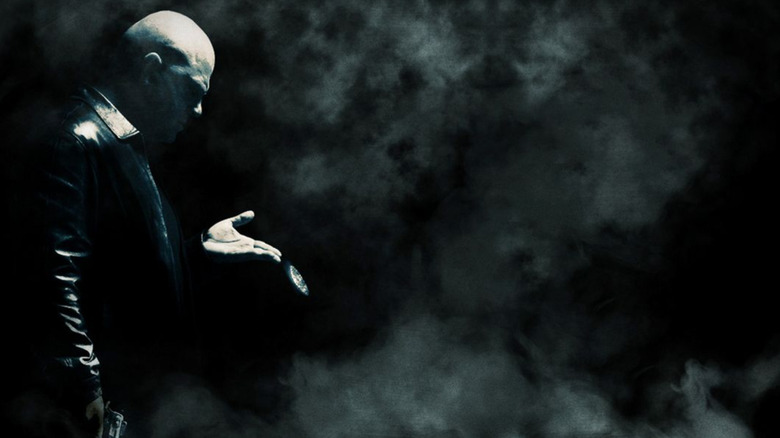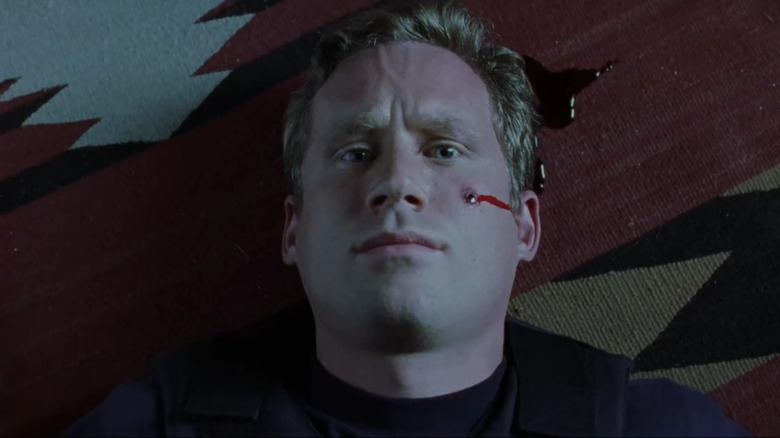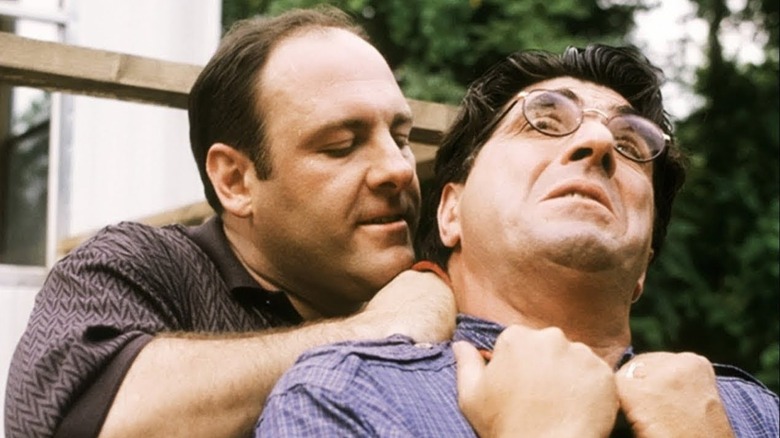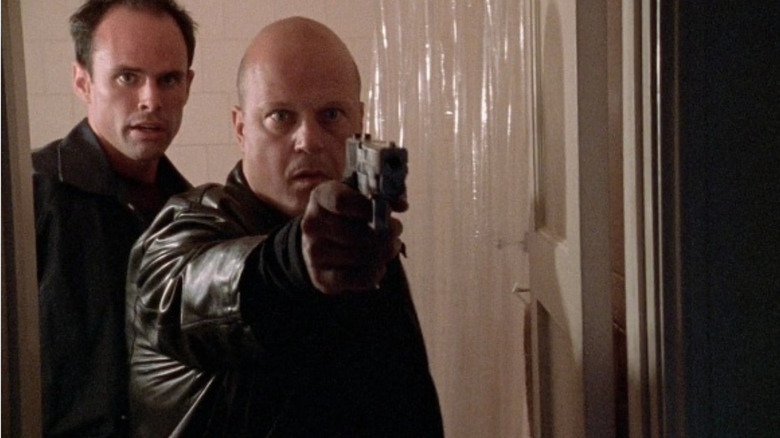The One Thing Shawn Ryan Would Change About The Shield
"The Shield," FX's cop drama about the LAPD's anti-gang "Strike Team," is easily one of the most satisfying dramas of the Prestige TV era. It's all because of one word: consequence. Stories organically feed into one another across seasons and the characters never escape the results of their actions, even if those results aren't the obvious ones. Watching the bill come due for Vic Mackey (Michael Chiklis) in the finale, "Family Meeting," is as rewarding a TV experience as can be.
Creator Shawn Ryan is justifiably proud of the series, but he's also admitted that if he had better foresight of the show's success, then he might have changed the very thing that made "The Shield" an instant hit. Namely, the ending of the pilot where Vic shoots Detective Terry Crowley (Reed Diamond), a double agent placed on the Strike Team by Captain David Aceveda (Benito Martinez).
Keeping Terry Crowley around longer
For the 15th anniversary of "The Shield" in 2017, Ryan spoke to Entertainment Weekly. He revealed one of his inspirations was "Donnie Brasco," a film where Johnny Depp plays a fictionalized version of FBI agent Joe Pistone. Pistone infiltrated the Bonanno crime family with the titular alias; his main contact and "friend" was Lefty Ruggiero (played by Al Pacino). The similarities between Pistone and Crowley are clear.
Crowley's fate in "The Shield" came about because of an alternate, untrue-to-history ending to "Brasco" which Ryan envisioned.
"I remember sitting in the theater, thinking, 'Wouldn't it be a great twist right now if Al Pacino walked in and shot Johnny Depp in the face and you realize that he knew that Depp was an undercover cop trying to take him down?' I knew it wasn't going to happen since it was based on a true story [but] I never forgot that moment."
When Ryan was writing "The Shield" pilot, that idea came to back him. He admitted to EW that if he'd known "The Shield" was a sure success, he might've held off, letting the audience build more of a connection with Terry before killing him at the midpoint of the season. But the pilot needed a hook, and Terry's death was easily the best possible one. So, in the interest of getting the show picked up, or at least making the best pilot he could, Ryan decided to end the episode with Terry's death.
The pilot did its job of getting "The Shield" a full season order. Speaking to the New York Times during season 1's airing, then-FX president of entertainment Kevin Reilly recalled, "I thought the cop genre was tired and then I read the script by Shawn Ryan, and it knocked my socks off."
Fallout
The pilot's ending was even more daring in a wider context. When "The Shield" debuted, prestige anti-hero TV dramas were in their infancy. There also hadn't been (and still aren't) many TV series that showed cops doing something so nakedly evil. It's possible the decision could've backfired. Let's compare it with "The Sopranos," a contemporary show which Ryan has cited as an influence and which Reilly had a part in spearheading.
Tony Soprano (James Gandolfini) commits his first onscreen kill in episode 5, "College" — his victim, Fabian Petrulio (Tony Ray Rossi), was a "rat" just like Crowley. Showing the series protagonist committing cold-blooded murder was a revolutionary move at the time (to the point HBO almost vetoed it), but "The Shield" was even bolder. Aside from Terry's death happening in the pilot versus mid-season, Tony Soprano was a criminal; him being a murderer was to be expected. Vic was a cop, a supposedly heroic profession, and here he was gunning down his own men.
Obviously, Vic killing Terry didn't turn off audiences. If anything, it became — and remains — the show's selling point. The one cost? Terry isn't much of a character. Across his one episode worth of screen-time, we learn only a few details about him. Specifically, that he has a friendly history with Aceveda and he's working against the Strike Team out of personal ambition as much as heroism. In season 5, we find out he had a brother, Drew (Christopher May), who blames Vic for Terry's death and doesn't know how right he is.
And that's about it. It's understandable why, with the gift of hindsight, Ryan would choose to flesh out Terry a bit more as a character. However, I think he made the right call, because "The Shield" isn't Terry's story, it's Vic's.
Who's the hero?
In the aforementioned EW interview, Ryan recalled: "When [the series] did get picked up, I was like, 'Oh geez, what do we do now? Now, your lead character is a murderer, so what do you do?'" Yet, the writers being left in uncharted territory is why the show turned out so compelling.
Undercover cop stories have been done before; Ryan's admitted influence from "Donnie Brasco" alone reveals how well-tread that ground is. A corrupt cop killing one of his own then covering it up, all the while trying to convince himself he's still the good guy? Now that's unique, and having that premise for the rest of its run made "The Shield" a more innovative show. Sacrificing Terry to facilitate that story was a worthy trade.
There's also the twist nature of the pilot's ending. Terry was promoted as part of the main cast, and watching the pilot blind, one can think he'll have a bigger part than he does. Him dying so soon changes your perception of who the protagonist is and throws your expectations for a loop. Reed Diamond, Terry's actor, told The Ringer:
"It's that Ned Stark thing that happens with 'Game of Thrones.' You're going, 'Oh crap, anything could happen.' But we hadn't seen that before. That hadn't been part of television. That's what usually makes network television so boring, is there's no stakes. Because you know that anyone who's in the lead cast is going to live forever."
Terry's early death makes the show's message clear right off the bat. Alongside "The Wire," "The Shield" is one of the only cop shows that criticizes cops. Terry's death illuminates the root of corruption; heroic cops don't make an impact because real police departments are home to more Vic Mackeys than Terry Crowleys.



